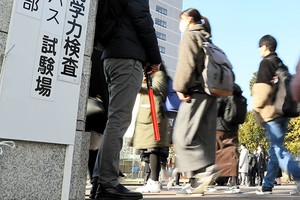June 13, 2024 at 12:44 JST
 Tokyo Governor Yuriko Koike declares her intention to run for a third term during a plenary session of the metropolitan assembly on June 12. (Shota Tomonaga)
Tokyo Governor Yuriko Koike declares her intention to run for a third term during a plenary session of the metropolitan assembly on June 12. (Shota Tomonaga)
The upcoming election for the Tokyo governorship is shaping up to effectively be a political battle between the ruling and opposition camps.
The poll to choose the leader of 14 million Tokyo citizens will not only be a verdict on Governor Yuriko Koike’s performance during her eight years in office but also a prognostic for the future of national politics.
It is hoped that this election will facilitate constructive policy debates and help restore trust in politics, which was tarnished by the ruling Liberal Democratic Party's slush fund scandal.
Koike has expressed her intention to run for a third term in the high-profile local government election in which campaigning will officially begin on June 20. The LDP and its junior coalition partner, Komeito, are expected to support her voluntarily.
The Constitutional Democratic Party of Japan, the Japanese Communist Party and the Social Democratic Party have decided to support Upper House member Renho, who has left the CDP to run as an independent.
This will turn the race into an effective face-off between the two candidates despite a field crowded with more than 30 candidates.
When she became Tokyo's first female governor eight years ago, Koike initially pitted herself against the LDP's Tokyo branch in what seemed to be a political positioning maneuver.
However, by tackling such massive challenges as responding to the COVID-19 pandemic and holding the Tokyo Olympics amid the public health crisis, Koike has shifted toward cooperation with the LDP, which governs the nation and represents the largest voting bloc in the Tokyo metropolitan assembly.
In some recent elections in Tokyo, Koike and the LDP worked together to promote the same candidates.
There are strong political reasons for the LDP to back Koike. After a series of electoral drubbings, the LDP has decided against nominating its own candidate.
Supporting Koike, who, as the incumbent, holds a solid advantage in the election, is a clear strategic decision by the ruling party aimed at halting its series of losses in local elections across the country since the Lower House by-elections in April.
Renho has criticized this partnership between the governor and the ruling party, denouncing Koike's administration as aiding the prolongation of LDP rule. She is seeking to position herself as a catalyst to unify political forces opposing both the LDP and Koike.
However, unless she can provide convincing policy alternatives to Koike’s by clarifying which of the governor’s policies she intends to change and in what ways, Renho is unlikely to win support from a broad spectrum of voters.
Renho’s election campaign will be a touchstone for the opposition’s strategy in the next general election.
While the metropolitan government is facing a wide range of policy challenges, one key issue in the capital’s governance is a controversial project to redevelop the scenic Meiji Jingu Gaien district in central Tokyo.
Opposition among Tokyo residents remains strong against the planned felling of hundreds of trees and the construction of skyscrapers. Candidates need to present their own clear perspectives and visions for the future of this central green space, preserved for about a century.
Another big and urgent question is what should be done to make the heavily populated and vibrant metropolis better prepared for the predicted massive earthquake that is expected to strike directly beneath the capital.
Although the area of densely packed wooden houses has halved in 10 years, new challenges, such as supporting commuters unable to return home and providing life support when high-rise buildings in the Tokyo Bay area are cut off from lifelines by lengthy power outages, need swift planning.
According to demographic estimates, by 2035, about one in four Tokyoites will be over 65 years old. Meanwhile, Tokyo's total fertility rate, or the average number of children a woman bears in her lifetime, has dropped below 1.0 to 0.99.
Candidates must offer a blueprint for managing the unprecedented demographic challenges of an aging and shrinking population in this megacity.
An important aspect of assessing Koike's administration is its approach to history. There is a call for a clear explanation regarding her decision to stop sending messages of remembrance to memorial ceremonies for the victims of the massacres of Koreans during the 1923 Great Kanto Earthquake.
We demand that Koike speak clearly about this issue.
--The Asahi Shimbun, June 13




















A peek through the music industry’s curtain at the producers who harnessed social media to help their idols go global.
A series based on diplomatic documents declassified by Japan’s Foreign Ministry
Here is a collection of first-hand accounts by “hibakusha” atomic bomb survivors.
Cooking experts, chefs and others involved in the field of food introduce their special recipes intertwined with their paths in life.
A series about Japanese-Americans and their memories of World War II